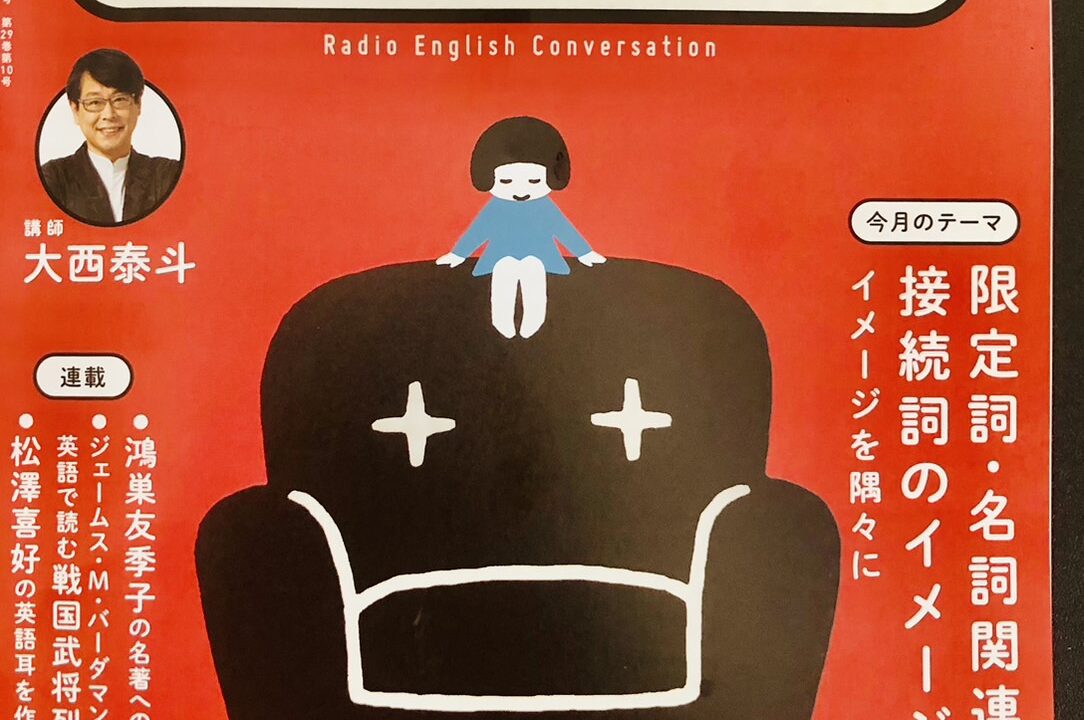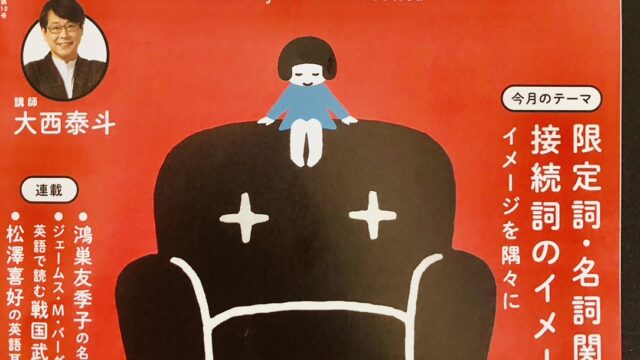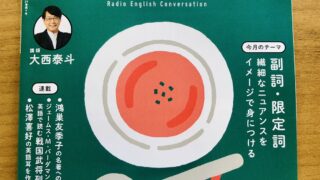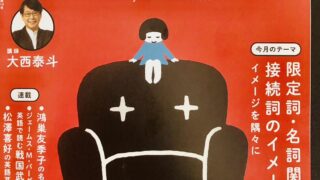【ラジオ英会話】Lesson 181 all, every のイメージ – December 26 Monday, 2022

December 26 Monday, 2022
Lesson 181 all, every のイメージ
☆Words & Phrases
Grandma has made dinner for us.
It smells wonderful. What is it? – Roast beef and mashed potato.
O: So why is “it” used here?
C: Well, it’s easy. Roast beef and mashed potato are considered to be “a dish,” just one unit. Therefore, the singular is used.
**used to ~:
We used to eat it every Sunday.
**such:
Grandma is such a great cook.
**chef:
Every family has its chef.
Dad is a good cook, but he uses all the plates in the kitchen. And I mean every plate.
**remember:
I remember that about him.
**clean up:
He’s not good at cleaning up.
**do the dishes:
Exactly. Mom always does the dishes.
☆Grammar & Vocabulary
① It smells wonderful.
説明型オーバーラッピング
be動詞文を典型例とする説明型の文。
説明型とは「主語の説明」を行う型。この文も、be動詞文と同様「it = wonderful」が基本的な意味だが、意味の薄い be動詞と異なり、smell には「匂いがする」という意味がある。
そのためそのsmell の意味が文全体に「オーバーラップ(重なる)」する。つまり、
it = wonderful [な匂いがする]
となる。
この説明型の文では、
smell(匂いがする)
look(見える)
sound(聞こえる)
taste(味がする)
feel(感じがする)
など、知覚を表す動詞が頻繁に使われる。
② We used to eat it every Sunday.
used to「以前は〜だった・以前はよく〜した」
今はそうではない、という現在とのコントラストが意識された表現。
☆Key Sentence & Feel English
Every family has its chef.
every は all と同じように「すべての」と訳されるが、all よりはるかに緻密。
all: 全体をひっくるめる「全部」というおおらかな単語
every:「どの〜もみんな」と個々に意識が及ぶ単語 ⇦常に単数扱い
① every child
every customer
every participant
every member
→ every が単数扱いであることに慣れること!
❌ Every children
❌ Every customers
everybody/everyone も単数扱いなので
Everybody loves you.
となる。
② Every child has his [his or her] own room.
Every child has their own room.
→「every + 人」を受ける代名詞は伝統的に he だったが、男女を含むグループを男性を意味する代名詞 he で代表させる不合理から現在は he/she [he or she]、あるいは they も用いられます。
③ all the children
all students
all of us
all of the teachers
all the country
all the team
all day
→ allは大らかな「全部」で個々への意識は希薄。
all (the) ~
all of ~
の使い方にも慣れること!
all the country のように「ひとつ」のものの「全部・全体」を表すこともできる
④ We are all happy.
The teachers all agreed.
You can have it all.
all about Japan
all over Japan
→ all は文中の位置も大らか。
All of us ~
All the teachers ~
だけでなく、
We are all ~
The teachers all ~
などにもできる。
☆Expression in Action
①私たちは、すべてのお客様が大切だと考えています。(everyを使って)
**precious:
②チームのすべてのメンバーは、それぞれが果たすべき役割を持っています。(everyを使って)
**role to play:
③あなたはそのミーティング全部に出席しなければなりません。いやつまり、どのミーティングもすべてということですよ、いいですか?
**attend:
☆Ending
O: Hey Chris. Are you good at cooking?
C: Well, I don’t know if I’m good at cooking, but I enjoy it. To me, it’s a kind of therapy.
R: Hey, Chris. When are you bringing your roast beef and mashed potato?
C: Uuuu… One day.
December 26 Monday, 2022
Lesson 181 all, every のイメージ
(日本語訳・解説付き)
☆Words & Phrases
Grandma has made dinner for us.
おばあさんが私たちのために夕食を作っておいてくれました。
It smells wonderful. What is it? – Roast beef and mashed potato.
素晴らしい匂いがします。それは何ですか? – ローストビーフとマッシュポテトです。
※What is it? とローストビーフとマッシュポテトの2つの料理を it で受けていますね。
O: So why is “it” used here?
C: Well, it’s easy. Roast beef and mashed potato are considered to be “a dish,” just one unit. Therefore, the singular is used.
**used to ~: 以前は〜だった、以前はよく〜した
We used to eat it every Sunday.
私たちは以前は毎週日曜日にそれを食べていました。
**such: 非常に、とても
Grandma is such a great cook.
おばあさんは料理がとても上手です。
※名詞を「とても〇〇です」と強調するときは very ではなく such を使います。
❌ She is very a great gook.
**chef: シェフ、料理長
Every family has its chef.
どの家庭にも料理上手な人はいます。
Dad is a good cook, but he uses all the plates in the kitchen. And I mean every plate.
お父さんは料理が上手です、しかし彼はキッチンにある食器をすべて使います。本当にすべての食器をです。
※ And I mean ~ は、自分の真意を「しっかりと、正確に」伝えようとする意識が表れたフレーズです
**remember: 覚えている、思い出す
I remember that about him.
私は彼についてのそれを覚えています=彼がそうだったのは覚えています。
**clean up: きれいに掃除する、片付ける
He’s not good at cleaning up.
彼は片付けるのは得意ではありません。
**do the dishes: 食器を洗う
Exactly. Mom always does the dishes.
その通り。お母さんはいつも食器を洗います。
☆Grammar & Vocabulary
① It smells wonderful.
素晴らしい匂いがします。
説明型オーバーラッピング
be動詞文を典型例とする説明型の文。
説明型とは「主語の説明」を行う型。この文も、be動詞文と同様「it = wonderful」が基本的な意味だが、意味の薄い be動詞と異なり、smell には「匂いがする」という意味がある。
そのためそのsmell の意味が文全体に「オーバーラップ(重なる)」する。つまり、
it = wonderful [な匂いがする]
となる。
この説明型の文では、
smell(匂いがする)
look(見える)
sound(聞こえる)
taste(味がする)
feel(感じがする)
など、知覚を表す動詞が頻繁に使われる。
② We used to eat it every Sunday.
私たちは毎週日曜日にそれを食べていました。
used to「以前は〜だった・以前はよく〜した」
今はそうではない、という現在とのコントラストが意識された表現。
☆Key Sentence & Feel English
Every family has its chef.
どの家庭にも料理上手な人はいます。
every は all と同じように「すべての」と訳されるが、all よりはるかに緻密。
all: 全体をひっくるめる「全部」というおおらかな単語
every:「どの〜もみんな」と個々に意識が及ぶ単語 ⇦常に単数扱い
① every child
すべての子ども
every customer
すべてのお客様
every participant
すべての参加者
every member
すべてのメンバー
→ every が単数扱いであることに慣れること!
❌ Every children
❌ Every customers
everybody/everyone も単数扱いなので
Everybody loves you.
みんなあなたのことが大好きです。
となる。
② Every child has his [his or her] own room.
どの子も自分の部屋を持っています。
Every child has their own room.
どの子も自分の部屋を持っています。
→「every + 人」を受ける代名詞は伝統的に he だったが、男女を含むグループを男性を意味する代名詞 he で代表させる不合理から現在は he/she [he or she]、あるいは they も用いられます。
③ all the children
その子どもたち全員
all students
学生たちみんな
all of us
私たち全員
all of the teachers
先生全員
all the country
国全体
all the team
チーム全体
all day
一日中
→ allは大らかな「全部」で個々への意識は希薄。
all (the) ~
all of ~
の使い方にも慣れること!
all the country のように「ひとつ」のものの「全部・全体」を表すこともできる
④ We are all happy.
私たちはみんな幸せです。
The teachers all agreed.
先生方は全員同意しました。
You can have it all.
全部差し上げますよ。
all about Japan
日本についてすべて
all over Japan
日本中
→ all は文中の位置も大らか。
All of us ~
All the teachers ~
だけでなく、
We are all ~
The teachers all ~
などにもできる。
☆Expression in Action
①私たちは、すべてのお客様が大切だと考えています。(everyを使って)
We think every customer is precious.
**precious: 大切な、貴重な
②チームのすべてのメンバーは、それぞれが果たすべき役割を持っています。(everyを使って)
Every member of the team has their role to play.
**role to play: 果たすべき役割
③あなたはそのミーティング全部に出席しなければなりません。いやつまり、どのミーティングもすべてということですよ、いいですか?
You must attend all the meetings. I mean every meeting, OK?
**attend: 出席する
☆Ending
O: Hey Chris. Are you good at cooking?
C: Well, I don’t know if I’m good at cooking, but I enjoy it. To me, it’s a kind of therapy.
R: Hey, Chris. When are you bringing your roast beef and mashed potato?
C: Uuuu… One day.
December 26 Monday, 2022
Lesson 181 all, every のイメージ
(日本語→英語バージョン)
☆Words & Phrases
おばあさんが私たちのために夕食を作っておいてくれました。
→
素晴らしい匂いがします。それは何ですか? – ローストビーフとマッシュポテトです。
→
※ローストビーフとマッシュポテトの2つの料理を it で受けていますね。
**以前は〜だった、以前はよく〜した:
私たちは以前は毎週日曜日にそれを食べていました。
→
**非常に、とても:
おばあさんは料理がとても上手です。
→
※名詞を「とても〇〇です」と強調するときは very は使えません!
**シェフ、料理長:
どの家庭にも料理上手な人はいます。
→
お父さんは料理が上手です、しかし彼はキッチンにある食器をすべて使います。本当にすべての食器をです。
→
**覚えている、思い出す:
私は彼についてのそれを覚えています=彼がそうだったのは覚えています。
→
**きれいに掃除する、片付ける:
彼は片付けるのは得意ではありません。
→
**食器を洗う:
その通り。お母さんはいつも食器を洗います。
→
① すべての子ども
すべてのお客様
すべての参加者
すべてのメンバー
→ every が単数扱いであることに慣れること!
❌ Every children
❌ Every customers
everybody/everyone も単数扱いなので
みんなあなたのことが大好きです。
となる。
② どの子も自分の部屋を持っています。
どの子も自分の部屋を持っています。
→「every + 人」を受ける代名詞は伝統的に he だったが、男女を含むグループを男性を意味する代名詞 he で代表させる不合理から現在は he/she [he or she]、あるいは they も用いられます。
③ その子どもたち全員
学生たちみんな
私たち全員
先生全員
国全体
チーム全体
一日中
→ allは大らかな「全部」で個々への意識は希薄。
all (the) ~
all of ~
の使い方にも慣れること!
all the country のように「ひとつ」のものの「全部・全体」を表すこともできる
④ 私たちはみんな幸せです。
先生方は全員同意しました。
全部差し上げますよ。
日本についてすべて
日本中
→ all は文中の位置も大らか。
All of us ~
All the teachers ~
だけでなく、
We are all ~
The teachers all ~
などにもできる。



